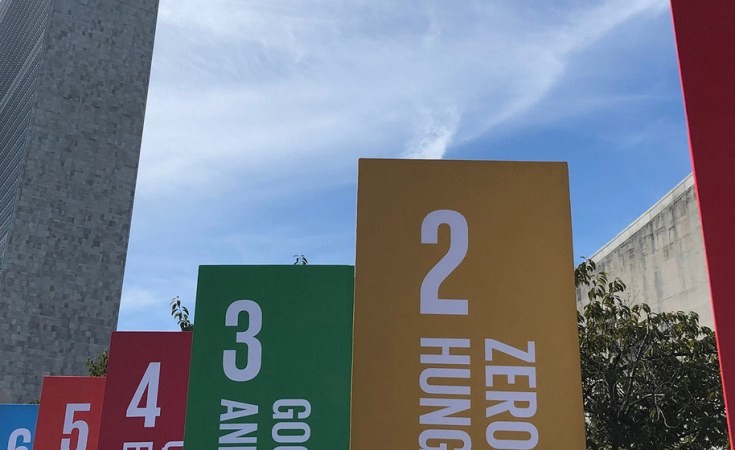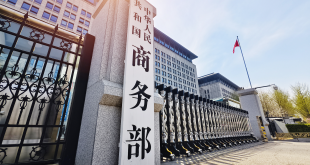ANALYSIS By Carlos Lopes

Sustainable Development Goals banners outside the United Nations Headquarters in New York on September 20, 2019.
When the United Nations started framing its Sustainable Development Goals (SDGs) in 2012 – a shared blueprint for working towards global peace and prosperity by 2030 – Africa was the first region to submit its list of priorities.
The continent was quick to act as it was in the process of finalising its Agenda 2063 framework, which sought to articulate African aspirations for the coming decades. It was a product of the celebrations of the 50th year of the Organisation of African Unity, now known as the African Union. Such a symbolic year was a cause for celebration and prompted reflection on what kind of Africa member states wanted to build in the next 50 years.
As the continent battles to contain and recover from the COVID-19 pandemic, it is confronted with a similar moment of reckoning. And the answer is the same: unify around a shared framework for the future that provides strategic direction for meaningful change.
But it can’t be all talk, no action.
From general agreement to tangible action
The UN’s SDGs, like the aspirations contained in the African Union’s Agenda 2063 framework, are bold and ambitious. But both sets of aspirations are painted with a broad brush. To a degree, it must be that way. Each nation has its own context, capacity and agenda, and the finer the tip, the harder it is to find agreement – the painting would never be completed. This is especially true when homing in on specifics for implementation, where leaders tend to disagree over the minutiae.
Take one of Agenda 2063’s flagship projects as an example. On the face of it, the African Continental Free Trade Agreement is an amazing success story, and the most important integration project in Africa’s history. Most African countries have signed and ratified the agreement. But, since it was officially launched in January this year, progress has been hampered by arguments over appropriate dispute mechanisms, clauses around rules of origin, and intellectual property rights.
It’s a difficult task transitioning from general agreement – a shared vision of the future – to practical implementation that delivers on development progress. But failing to mobilise behind a common agenda, with tangible action, could have dire consequences.
This is one of the reasons we can’t just leave things to governments. Those of us interested in advancing sustainable development in Africa need to find ways to broaden and deepen engagement and conversation around these critical issues and create the space where the diverse capacities of multiple stakeholders can be leveraged to find innovate solutions to the many challenges that the continent faces.
To this end, events such as the upcoming International Summit on SDGs in Africa organised by the University of Cape Town can play a valuable convening role. The summit will enable countries to revisit goals and targets in the light of effects of the COVID-19 pandemic. Scholars from across the globe will be able to define a roadmap that considers recurrent financing challenges but also the signs of a much stronger commitment to social protection and managing climate change.
Collaboration needs to be real and practical
The pandemic serves as a good example here. Despite proclamations of goodwill and good intentions towards Africa, when push comes to shove, the behaviour of the continent’s main partners has been selfish. It started with personal protective equipment, then with ventilators, and more recently with vaccines. For example, soon after the outbreak countries such as the UK and the US introduced measures to restrict exports of protective equipment.
For its part the European Union remains resistant to calls to waive vaccine-related patents.
Africa has been here before. Millions of people died of HIV/AIDS during 17 years of protracted negotiations over intellectual property rights to get a patent waiver. Many calls by developing countries to accelerate Trade-Related Aspects of Intellectual Property Rights waivers on anti-retroviral drugs to save the lives of populations deeply affected by the spread of HIV/AIDS were ignored until the pharmaceutical interests shifted to ensuring large purchases by donors of their products about to lose their profit edge.
Now, Africa is asking for a waiver for COVID-19 vaccines and is facing the same discussions.
In any event, Africa shouldn’t see relinquishing of intellectual property rights as a silver bullet. Materials required for manufacturing, the right supply chains, time to build stock, all need solving. Additionally, issues around ethics and law need to be considered.
Recognising this complexity the Africa Centres for Disease Control has launched no fewer than three initiatives – the African Union’s Pharmaceutical Manufacturing Plan for Africa, the African Medicines Agency and the African Vaccine Regulatory Forum – aimed at establishing an ecosystem to enable manufacturing of vaccines in the continent.
All of this calls for discussion between a wide cross-section of stakeholders to prioritise areas of strategic focus, as well as scope actions that will accelerate progress before the next crisis hits. Collaboration can’t be a chimera; it needs to be real and practical.
But collaboration also cannot take place in a vacuum.
A common trial
As new COVID-19 variants spread, the commonality of the trial we face is clear to see. To be purely tactical and try to tackle this disease with a narrow, temporary focus, allowing protectionism to rear its ugly head, will limit Africa’s capacity to address the problem today. It will also do nothing to strengthen our resilience for the challenges of tomorrow.
It is here that the UN’s SDGs and African Union’s Agenda 2063 vision have a key role to play. While their time frames – the SDG’s is 2030 – are long and their aspirations lofty, it’s exactly these qualities that can help us to lift our heads when times are tough; to see the big picture and to know what we are aiming for.
Now, more than ever, leaders need to lean into the strategic frameworks they helped develop, but they also need to roll up their sleeves and work with a broad set of stakeholders to develop practical ways to achieve their aspirations within these frameworks.
It’s only through this kind of strategic cooperation leading to effective implementation that we can hope to shape the future we want and avoid the one we don’t.
Carlos Lopes, Professor at the Nelson Mandela School of Public Governance, University of Cape Town
 Africa -China Review Africa -China Cooperation and Transformation
Africa -China Review Africa -China Cooperation and Transformation
